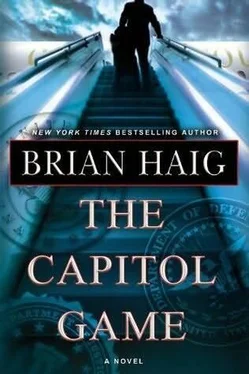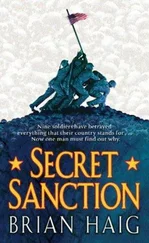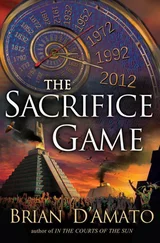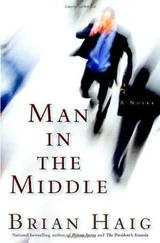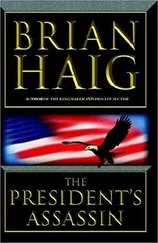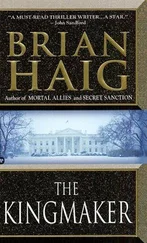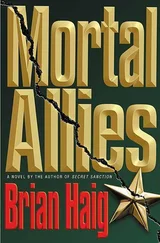Jack first shook Windal’s hand, then the secretary’s. Windal’s shake was halfhearted but firm, while Robinson’s grip was limp bordering on flaccid. In truth, the secretary appeared exhausted, almost depleted: Jack thought he had aged considerably from the TV images of only a year before. He had large rings under his eyes, a dark suit that looked loose and baggy as though he had experienced a sudden weight loss, and a pale, resigned smile that suggested this meet-and-eat was at the bottom of his wish list. He’d far rather be taking a nap.
Robinson turned to Haggar, who, for a very brief period, had been his number two. “How you doing, Alan? Getting rich?”
“Working on it. That’s what we’re here to talk about,” Alan said with a wicked smile, making no effort to disguise their purpose. They began shuffling and ambling to the table.
“So what are you guys pitching today?” Robinson asked wearily, as if they were annoying insurance salesmen.
“Would you care to guess?”
“That polymer your blowhard Walters was bragging all over TV about a while ago? Am I right?”
“Yes, and we’ll get to it in a moment,” Bellweather said, falling into the seat directly to the right of Robinson. “So how’s the war going?” he asked, casually flapping open his napkin.
“Which one?” Robinson asked, a little sadly.
“We get a choice?”
“You do, but I don’t. Iraq? Afghanistan? The war on terror?”
“Why don’t we start with Iraq?”
“Just horrible. My in-box is crammed every morning with letters awaiting my signature. Condolence notes to parents about their kids that were killed. I can barely sleep. Do you know what that’s like, Dan?”
Bellweather quietly nodded. He thought it best, though, not to remind Robinson that he’d gotten 160 soldiers killed on that senseless lark to Albania. Truthfully, he couldn’t even remember what that was about. Albania? He must’ve been high or tanked when he ordered that operation.
Then again, he hadn’t sent any letters or even brief notes to the families. Why should he? Death was one of the things their kids were paid for. “Thank God I was spared that fate,” he replied, scrunching his face solemnly, munching on his salad. “How about Afghanistan?”
“More of the same.” A brief pained pause. “Just not as bad, thankfully, at least not yet. But there’s always the future not to look forward to.”
With only twelve minutes left, they weren’t going to waste more time or words commiserating with Robinson. Haggar, always the numbers man, worked up a concerned expression and launched in. “Do you know how many of those soldiers were killed by explosive devices?”
“Somebody, a month or two ago, showed me a chart. I don’t recall the numbers exactly. I know it’s a lot.”
“Well, you’ve had 3,560 killed as of this morning,” Haggar said casually, as if they were discussing ERA stats in baseball. “Twenty percent due to accidents, disease, friendly fire, the usual cost of business.” A brief pause. “Sixty-eight percent of the total were a direct result of explosives.”
“Is that right?”
“Yeah, well over half. Amazing when you think about it, and ninety percent of those were roadside IEDs. Another ten percent were killed by rockets or roadside ambushes.”
“Higher than I thought.”
Bellweather reached across the table for the ketchup. “That’s why we’re here, Doug,” he explained. “We want to help.”
Laughable as that claim was, nobody so much as smiled.
“And you think this polymer will make a difference?” the secretary asked.
Bellweather was smacking the bottom of the bottle hard, slathering his hamburger and French fries in ketchup. “Jack, tell him about it,” he ordered without looking up.
Jack quickly raced through a description of the polymer, briefly encapsulating the physics behind it, the years spent in research, the difficulty of getting it just right. He was careful to come across as factual rather than boastful. A light dissertation more than a sales pitch.
“You might want to look at this,” suggested Haggar as he handed the secretary a copy of the pictorial results from the live testing done in Iraq. Robinson was barely eating, Jack noted, pushing a fork aimlessly around on his plate. He slid on a pair of reading glasses, opened the book, and began quietly flipping pages while Haggar began to prattle about the miraculous results.
After a quick pictorial tour, he removed his glasses and handed the book to Windal, his undersecretary. “Take a look at these,” he said, obviously impressed. “So what do you want me to do?” he asked, ignoring Haggar and now looking at Bellweather.
“Jesus, Doug,” Bellweather said, as if the question were facetious. “This screams for a fast-track, no-bid approach.”
“That’s a big request, Dan.”
“Is it? Haggar’s statistics show we’re losing eight soldiers a week to bombs. It’s become the insurgents’ weapon of choice. Our kids are sitting ducks. That’s nearly forty soldiers a month, blown apart and butchered while we look for a way to protect them. Now we have it.”
Robinson turned to Windal, whose nose was still buried in the photographs. “What do you think, Tom?”
Windal shoved the book aside, shook his head, and scowled. “Damn it, I know how important this is. The generals have been screaming at me for over a year. We’ve thrown billions into this and it’s about to pay off. There’s a lot of promising programs out there right now. Uparmoring, three or four new bomb-resistant vehicles, even the use of robotics to locate the bombs and disarm them. The best minds have worked this problem and the results are coming in. It’s very competitive.”
“Yeah, and all of those ideas are crap. They take way too much time to make it into the field,” Haggar argued, quickly and vigorously.
“Time is a consideration, but-”
“New vehicles have to be tested, refined, built, then fielded,” Haggar continued, waving his arms for emphasis. “That takes years. And those programs are habitually plagued by big setbacks, maintenance glitches, and unexpected delays. The schedules aren’t worth the paper they’re written on. Uparmoring kits aren’t much better. And when you add the weight of heavy armor on vehicles not designed for it, you pay the price in busted transmissions, collapsing frames, and faulty brake systems. You know that.”
Bellweather, chewing a big bite of his hamburger, said, “He’s right,” as if there was any chance of disagreement.
“Everything takes time,” Windal answered, almost apologetically.
“Not our polymer. Mix it, then paint it on. We could have it in mass production inside a month. Thirty days. How do those other programs stack up against that?”
“A no-bid, single-source contract is out of the question. I’m sorry.”
“Why?”
“You know why, Alan. The competitors would raise hell. They have billions invested in their alternatives. A lot of their ideas are absolutely ingenious. They won’t let you end-run them this way.”
“Screw ’em. Lives are at stake and that’s all we care about,” Bellweather insisted, failing miserably to make it sound sincere.
“It’s not that simple. If this polymer’s as good as you say, you should be more than willing to expose it to testing and fierce competition.”
“Forty lives a month, Tom. Waste another year, that’s four hundred lives, minimum. Think of all those letters cluttering Doug’s in-box.”
“Look, I’d get raped if I caved in to your request. Your competitors are just as powerful, just as well connected as you fellas. They’ve got deep pockets and plenty of influential friends on the Hill.”
“So that’s it?”
Читать дальше
